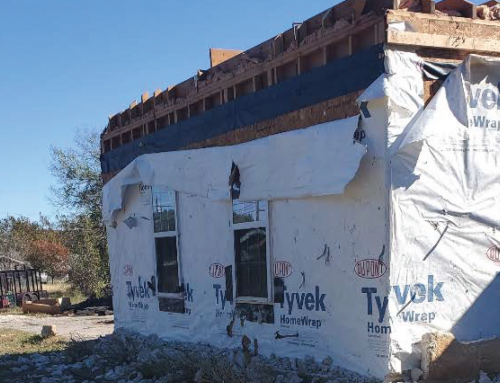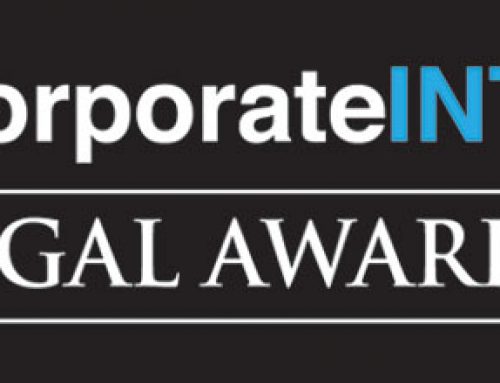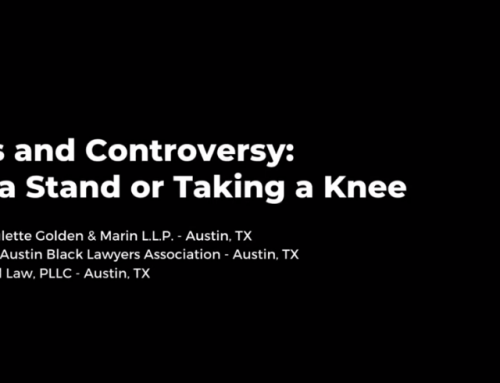In lawsuits filed on or after June 17, 2011, a defendant may have the right to dismissal and an award of attorney’s fees and costs under Chapter 27 of the Texas Civil Practices and Remedies Code, also known as the Texas Citizens Participation Act or the Texas Anti-SLAPP Statute.
SLAPP stands for “Strategic Lawsuit Against Public Participation.” It refers to a lawsuit filed against an individual who spoke out on a public issue or controversy. You might be “SLAPPed” for actions such as posting a blog entry, posting a comment on another person’s blog, writing a letter to the editor of a newspaper, testifying before the legislature, reporting official misconduct, or circulating a petition.
The purpose of the Anti-SLAPP Act in Texas was to limit such lawsuits and encourage “citizen participation” which includes “commenting on the quality of a business”. House Comm. On Judiciary & Civil Jurisprudence, Bill Analysis, Tex. H.B. 2973, 82nd Leg., R.S. at p. 1 (2011), (“Bill Analysis”).
In enacting the new law, the Texas Legislature acknowledged that “[t]he Internet age has created a more permanent and searchable record of public participation”, but that as a result, “abuses of the legal system, aimed at silencing these critics, have also grown”, (see Bill Analysis at p1).
Accordingly, the Legislature adopted the Act to add protection to free speech on the Internet. The Act was passed by the House on May 4, 2011, by the following vote: Yeas 142, Nays 0, 2 present, not voting; and was passed by the Senate, on May 18, 2011, by the following vote: Yeas 31, Nays 0. The Act was signed into law effective June 17, 2011.
A CLOSER LOOK AT THE TEXAS ANTI-SLAPP STATUTE
The Act defines the exercise of the right of free speech as any communication made in connection with a matter of public concern, (Tex. Civ. Prac. & Rem. Code § 27.001(3)).
A matter of public concern means any issue related to a… good, product, or service in the marketplace, (Tex. Civ. Prac. & Rem. Code § 27.001(7)).
Under the Texas Citizens Participation Act, an action brought over protected speech is subject to immediate dismissal unless the plaintiff can show, at the outset of the litigation, that the lawsuit is well supported both legally and factually.
If a defendant wishes to move for dismissal under the Act, he must do so within 60 days after service of the legal action, unless the time is extended by the court for good cause, (Tex. Civ. Prac. & Rem. Code § 27.003(b)). The filing of the motion to dismiss stays all discovery until the court has ruled on the motion, (Tex. Civ. Prac. & Rem. Code § 27.003(c)), unless the court permits limited discovery related to the motion itself, (Tex. Civ. Prac. & Rem. Code § 27.006(b)). The court must set a hearing date on the motion to dismiss within 30 days of its service, unless docket conditions require otherwise, (Tex. Civ. Prac. & Rem. Code § 27.004), and the court must then decide the motion within 30 days of its hearing, (Tex. Civ. Prac. & Rem. Code § 27.005(a)).
In general, the court must grant the motion and dismiss the action if the movant shows by a preponderance of the evidence that the action is based on, relates to, or is in response to the party’s exercise of the right of free speech, the right to petition, or the right of association, (Tex. Civ. Prac. & Rem. Code § 27.005(b)). The court may not dismiss, however, if the claimant establishes by clear and specific evidence a prima facie case for each essential element of the claim in question, (Tex. Civ. Prac. & Rem. Code § 27.005(c)). In deciding the motion, the court must consider the pleadings and supporting and opposing affidavits stating the facts on which the liability or defense is based, (Tex. Civ. Prac. & Rem. Code § 27.006(a)).
THE MOTION TO DISMISS AND THE HEAVY BURDEN OF PROOF FOR PLAINTIFF
Upon a showing that the action is “based on, relates to, or is in response to” the exercise of free speech, the burden shifts to the plaintiff who then must establish, by clear and specific evidence, a prima facie case for each and every element of its claim. At such an early stage in the litigation, this can be a heavy burden for a Plaintiff to overcome.
For example, anti-SLAPP lawsuits frequently claim that the plaintiff has been the victim of defamation. To maintain a cause of action for defamation, among other things the plaintiff must demonstate that the defendant (1) published a statement (2) that was defamatory concerning the plaintiff (3) while acting with either actual malice, if the plaintiff was a public figure, or negligence, if the plaintiff was a private individual, regarding the truth of the statement, Hearst Corp. v. Skeen, 130 S.W.3d 910 (Tex. App. 2004) review granted, judgment rev’d, 159 S.W.3d 633 (Tex. 2005).
To prove an action for defamation, the statement must also be false. Musser v. Smith Protective Services, Inc., 723 S.W.2d 653, 655 (Tex. 1987).
“Opinion and fair comment privilege” also grants legal immunity for the honest expression of opinion on matters of legitimate public interest when based upon a true or privileged statement of fact, Hearst Corp. v. Skeen, supra 130 S.W.3d 910 (Tex. App. 2004).
Further, “substantial truth” is an affirmative defense to a defamatory claim. A statement is substantially true, and thus not actionable, if its “gist” or “sting” is not substantially worse than the literal truth. Hearst Corp. v. Skeen, 130 S.W.3d 910 (Tex. App. 2004) review granted, judgment rev’d, 159 S.W.3d 633 (Tex. 2005).
If a plaintiff cannot prove each of these elements of the defamation claim then the matter will likely be dismissed.
The point here is that before this legislation, a corporation could file a lawsuit against an individual alleging defamation and the corporation may not have to prove every element of its case until trial. And to get to that stage, the individual would have to spend tens of thousands of dollars in legal fees. Knowing this, a corporation could bully the individual into submission. Otherwise know as a “Strategic Lawsuit Against Public Participation” (SLAPP). Now, the corporation has to prove every element of its case within 60 days of filing the lawsuit, and if it does not, it will have to pay the individual’s attorneys’ fees and costs.
Another common claim that will fall under the Texas Anti-SLAPP statute is a claim sounding in business disparagement. The tort of business disparagement differs from defamation in that defamation actions chiefly serve to protect the personal reputation of an injured party, while a business disparagement claim protects economic interests, Forbes Inc. v. Granada Biosciences, Inc., 124 S.W.3d 167 (Tex. 2003).
However the evidence required for the plaintiff to avoid dismissal is equally burdensome. Specifically, to prevail on a business disparagement claim, a plaintiff must establish that (1) the defendant published disparaging words about the plaintiff’s economic interests, (2) that were false, (3) that were made with malice, (4) without privilege, and (5) that resulted in special damages to the plaintiff. Forbes Inc. v. Granada Biosciences,Inc., 124 S.W.3d 167, 170 (Tex. 2003).
Moreover, proof of special damages is an essential part of a cause of action for business disparagement. The requirement goes to the heart of the cause of action itself and requires that the plaintiff “establish pecuniary loss that has been realized or liquidated as in the case of specific lost sales” Hurlbut v. Gulf Atl. Life Ins. Co., 749 S.W.2d 762, 767 (Tex. 1987), citing to W. Keeton, Prosser and Keeton on the Law of Torts, § 128 at 971 (5th Ed.1984).
To prove special damages as an element of a business disparagement claim, the plaintiff must prove that the disparaging communication played a substantial part in inducing third parties not to deal with the plaintiff, resulting in a direct pecuniary loss that has been realized or liquidated, such as specific lost sales, loss of trade, or loss of other dealings, Astoria Indus. of Iowa, Inc. v. SNF, Inc., 223 S.W.3d 616 (Tex. App. 2007).
Texas courts have also rejected the argument that gross sales reflected in tax returns can support an award of lost profits. See Rusty’s Weigh Scales and Serv., Inc. v. N. Tex. Scales, Inc., 314 S.W.3d 105, 111 (Tex.App.-El Paso 2010, no pet.).
Accordingly, a corporation will need to carefully consider all the evidence before filing a claim for business disparagement against an individual.
IF THE MOTION TO DISMISS IS GRANTED, THE COURT MUST AWARD ATTORNEY’S FEES AND SANCTIONS TO THE MOVANT
Pursuant to §27.009 of the Act, if the motion to dismiss is granted, the court must also award to the movant: (1) its court costs, reasonable attorney’s fees, and other expenses incurred in defending the action as justice and equity may require; and (2) sanctions against the party who brought the action as the court determines are sufficient to deter that party from bringing similar actions.
Although very few cases have been brought under the new Act, Texas courts have enforced the new provisions of the Ant-SLAPP Statute where appropriate, dismissing cases and awarding attorney’s fees and sanctions to the moving party.
In Monaco Entertainment Group, LLC and David Cooper v. City of El Paso, et al, US District Court, Western District, (unreported, Cause No. EP-11-CV-561-DB), (2012), Plaintiff bar owner claimed that Defendant neighborhood association made defamatory and disparaging comments about the bar at a City Council meeting for the bar’s liquor license.
The Court granted Defendant’s motion to dismiss pursuant to the Act, finding Plaintiffs’ claims to be “frivolous, without merit, and made only to stifle opposition”.
In American Heritage Capital, LP, v Dinal Gonzalez and Alan Gonzalez, District Court, 68th Judicial District, Dallas County, (unreported, Cause No. DC-11-13741-C), (2012), Defendant visited several websites that allow users to comment on the quality of various businesses. Defendant posted various comments on the websites to caution visitors of Plaintiff’s poor handling of their business dealings.
Based exclusively on Defendant’s comments, Plaintiff asserted claims of libel and tortious interference with prospective business relationships in a clear attempt to limit the exercise of constitutionally protected free speech.
The Court granted Defendant’s motion to dismiss pursuant to the Texas Citizens Participation Act. Following a separate hearing on the issues of damages and costs, the Court awarded Defendant $15,616.00 in reasonable attorneys’ fees pursuant to §27.009 of the Act. The Court also ordered that Defendant should recover $15,000.00 in sanctions from Plaintiff to prevent Plaintiff from bringing similar actions in the future.
Most recently, Pete Reid Law, PLLC defended the rights of an individual who had posted comments about the quality of a business on various consumer websites including Yelp and CitySearch. The Business commenced a lawsuit against the consumer in Bastrop County alleging that the comments were defamatory and that the Business had lost profits and suffered damages in the amount of approximately $100,000.00.
After oral argument the case was dismissed and the Judge ordered that, pursuant the new anti-SLAPP statute, the consumer should recover reasonable attorneys’ fees in the amount of $5,000.00 from the business that brought the lawsuit, as well as sanctions in the amount of $500.00. Rustic Cedar Cabins of Texas, Inc. v. John Cortell, 12st Judicial District, Bastrop County, (unreported, Cause No. 28,500), (2012), (More about this case, including the Judgment here).
In short, the Texas Citizens Participation Act is a powerful, but as yet underutilized shield for individuals and consumers, that promotes judicial economy, that restricts corporations from using lawsuits as a bullying tactic, and that aims to protect the First Amendment rights of all Texas citizens.
This article was written by Pete Reid, Esq. as adapted from the Bench Memorandum served with the Motion to Dismiss in the matter of Rustic Cedar Cabins of Texas, Inc. v. John Cortell, 12st Judicial District, Bastrop County, (unreported, Cause No. 28,500), (2012).






